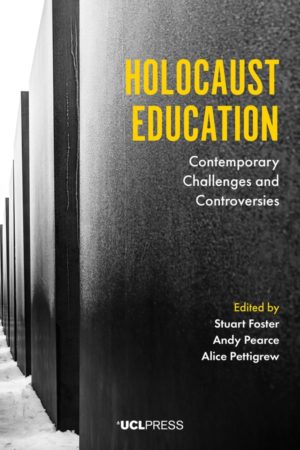We are delighted to announce UCL Press Open Access publication of a major new Centre-authored collection, Holocaust Education: Contemporary challenges and controversies.
Teaching and learning about the Holocaust is central to school curriculums in many parts of the world. As a field for discourse and a body of practice, it is rich, multidimensional and innovative. But the history of the Holocaust is complex and challenging, and can render teaching it a complex and daunting area of work.
Drawing on landmark research into teaching practices and students’ knowledge in English secondary schools, Holocaust Education: Contemporary challenges and controversies provides important knowledge about and insights into classroom teaching and learning. It illuminates key challenges in Holocaust education, including the impact of misconceptions and misinformation, the dilemmas of using atrocity images in the classroom, and considerations of teaching in ethnically diverse environments. Overviews of the most significant debates in Holocaust education provide wider context for the featured chapters, and contribute to a book that will act as a guide through some of the most vexed areas of Holocaust pedagogy for teachers, teacher educators, researchers and policymakers.
The Centre’s empirical research lies at the heart of this 10-chapter collection. As Senior Research Associate and co-editor, Dr Alice Pettigrew, notes, sharing this book and returning these finding to teachers and schools is crucial, as is acknowledging their contributions and insights, sharing best practice, but also in enabling front-line practitioners to refine and enhance their practice in light of new evidence and emerging scholarship. As Pettigrew observes,
‘Over the last ten years, thousands of secondary school students and teachers have kindly shared their thoughts and experiences with researchers from the UCL Centre for Holocaust Education to help us better understand teaching and learning about this complex history in England’s secondary schools. We really appreciate all the time they have given us and are delighted that, with the publication of UCL’s Open Access collection, Holocaust Education: Contemporary Challenges and Controversies, the research they so significantly contributed to will find new and expanded audiences. Within the collection, individual chapter authors critically consider the Centre’s research findings in relation to important contemporary issues such as antisemitism, the use of atrocity images, the employment of popular historical fiction and teaching at primary school. Through these and other chapters, we hope that the classroom experiences of future students and teachers will continue to be impacted by the insights that earlier research participants shared.’
Whilst it will find a key audience among teachers, educationalists and schools, co-editor Dr Andy Pearce reflects upon the collection’s potential to inform and stimulate academic debate:
‘The field of Holocaust studies is vast and sprawling: it traverses traditional disciplinary boundaries and is home to innovative approaches. Yet, Holocaust education – as a body of practice and an area of academic research – has, for some time, existed only on the margins of Holocaust studies. With this collection, academics working in Holocaust studies can extend and deepen what they know and understand about some of the key issues and challenges around teaching and learning about the Holocaust. In the process, they will be able to identify new connections with other realms of Holocaust-related research.’
Executive Director of the Centre, and co-editor, Professor Stuart Foster summaries the publication and process thus:
‘…it was a privilege to work with colleagues to discuss and identify some of the most contentious and difficult issues in Holocaust education… this ground-breaking, new book tackles head on many of the most complex contemporary questions in Holocaust Education (e.g., how should we teach about Britain’s response? What knowledge is essential for student understanding? Should ‘The Boy in Striped Pyjamas’ be shown/read?) It also focuses on key issues and challenges including the perspective of Muslim students, the psychology of ‘obeying orders’ and the use or appropriateness of atrocity images…It is a must read for teachers, teacher educators, researchers and policymakers.’
From today you can access this new publication, individual chapters or the whole text, via UCL Press Open Access: http://tiny.cc/i6q5pz
A new blog by Dr Andy Pearce reflects upon the new publication, within the context of COVID-19 and online learning… it can be found here:
Look out for a range of online launch events and opportunities to actively engage in the debates raised by this new publication via our website and @UCL_Holocaust in coming weeks.

